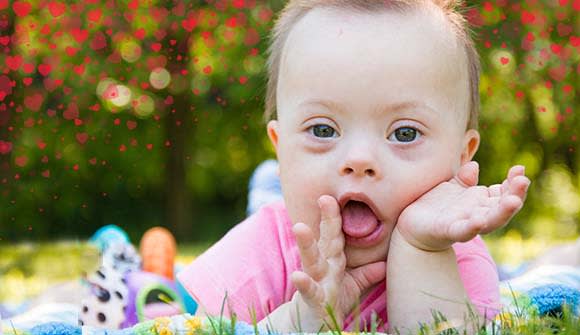Special hearts
Babies with Down syndrome are at higher risk of having a congenital heart defect.
Article Date:

About 1% of all children are born with congenital heart disease, which is one or more heart defects present at birth. But for babies born with Down syndrome, the risk is much higher.
Down syndrome is a condition in which a baby is born with an extra copy of the 21st chromosome, resulting in changes in the development of the brain and body. It's the most common chromosomal condition in the U.S., with approximately 6,000 babies diagnosed each year.
“Congenital heart disease is the most common type of birth defect, and about half of all children born with Down syndrome will have a heart defect of some kind,” said Rajesh Shenoy, MD, a pediatric cardiologist and medical director of Wolfson Children’s C. Herman and Mary Virginia Terry Heart Institute. “While the association between Down syndrome and congenital heart disease is well known, the exact reason for the high incidence of heart defects isn’t clear. Researchers speculate that the absence of some genetic material important for the normal development of the heart might be responsible.”
Detecting heart problems early
A baby’s heart is fully developed early on in pregnancy, at around 10 weeks gestation. Down syndrome can also be detected through diagnostic testing during pregnancy. Because of this, some heart defects associated with Down syndrome can be revealed before the baby is even born.
“Pediatric cardiologists with expertise in fetal echocardiography are able to diagnose most complex congenital heart defects as early as 14 weeks of pregnancy,” said Dr. Shenoy. “If Down syndrome is suspected in the fetus, specialized imaging is necessary. This is why most significant congenital heart defects in babies with Down syndrome are often diagnosed prenatally.”
If a baby is born with Down syndrome but not prenatally diagnosed, he or she will receive an echocardiogram, or ultrasound of the heart, to check for defects before leaving the hospital.
Specialized prenatal care and delivery
“Expectant mothers of babies with Down syndrome should seek fetal echocardiography at a specialized center, where a multi-disciplinary team comprised of maternal-fetal medicine and pediatric cardiology specialists can evaluate the baby,” said Dr. Shenoy. “If the fetus does have a heart defect, an accurate diagnosis is crucial.”
Dr. Shenoy further explained, “Babies with severe forms of heart defects should be delivered at a tertiary or highly specialized institution like Baptist Medical Center Jacksonville, which has access to Wolfson Children’s Neonatal Intensive Care Unit and the Terry Heart Institute and can provide seamless care during the prenatal period and after birth. The Terry Heart Institute’s multi-disciplinary approach to care, involving pediatric cardiologists, maternal-fetal medicine specialists, neonatologists, surgeons, anesthesiologists and cardiovascular intensive care specialists, ensures the best possible outcomes for these patients.”
Common heart conditions associated with Down syndrome
The most common type of congenital heart defect in babies with Down syndrome is an atrioventricular septal defect, a large hole in the center of the heart. It occurs in approximately 25% of all babies born with Down syndrome.
Other heart defects that commonly occur in babies with Down syndrome include:
- Atrial septal defect (hole in the wall between the heart’s upper chambers)
- Ventricular septal defect (hole in the wall between the heart’s lower chambers)
- Tetralogy of Fallot (combination of four congenital heart defects present at birth)
Healing little hearts
Depending on the complexity and severity, most major congenital heart defects, or combinations of them, require one or more surgeries to correct. But some minor heart defects may not require surgery at all.
“In the case of atrioventricular septal defects, treatment typically consists of medications and feeding supplements,” said Dr. Shenoy. “Babies with more serious symptoms such as fast breathing, poor feeding and inability to gain weight may also require surgery to repair the defect. Babies with milder forms may not show symptoms, and surgery can be delayed until they are 2 to 4 years old.”
A heart defect in a newborn can be scary for any parent, but Dr. Shenoy offered reassurance that the care for infants and children with congenital heart defects and Down syndrome has greatly improved over the years.
“New techniques, technological advancements and greater knowledge of the conditions have led to earlier intervention and better treatment of congenital heart disease,” said Dr. Shenoy. “The vast majority of kids today go on to live completely healthy lives.”
Treating heart conditions in children is our specialty
The pediatric cardiology, electrophysiology, imaging, cardiac intensive care, cardiac anesthesiology and heart surgery teams with Wolfson Children’s C. Herman and Mary Virginia Terry Heart Institute treat a full range of pediatric cardiac conditions, from defects present at birth to heart rhythm disorders. To learn more, call 904.202.8550 or visit wolfsonchildrens.com/heart.



